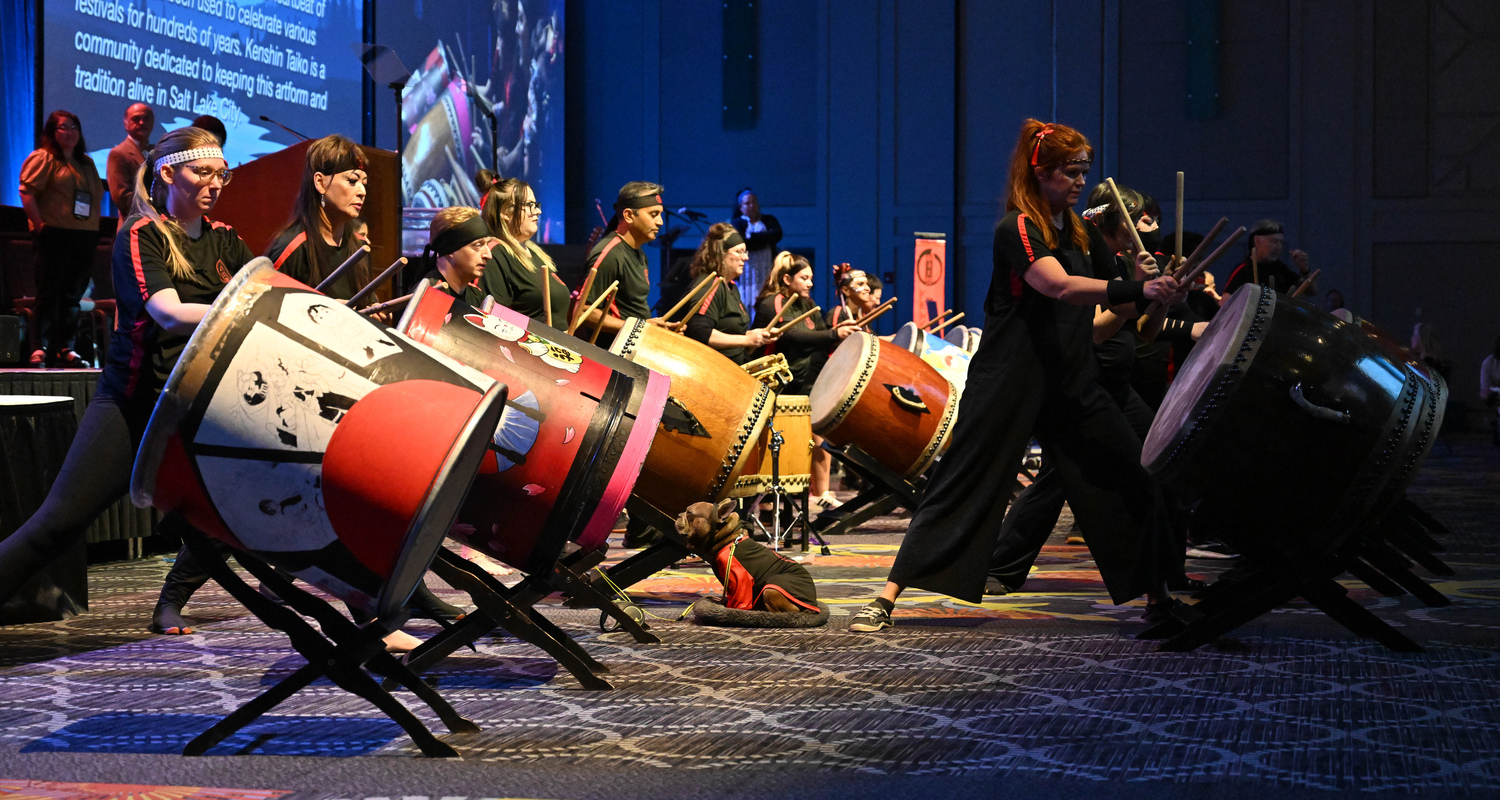.jpg)
Closing worship at GA226 was led by the Rev. Dr. Victor Aloyo, President of Columbia Theological Seminary in Decatur, Georgia. Photo by Rich Copley
As people began filing out of the plenary hall at the close of business on the Assembly’s last day — no doubt to catch their earlier flights — the strains of Healey Willan’s “Finale Jubilante” filled the space.
The final singing of “Live into Hope” — the Assembly’s theme and the name of the 1976 hymn text by Jane Parker Huber from which each day’s worship theme was selected — set the tone for a stirring proclamation of the gospel by the Rev. Dr. Victor Aloyo, Jr., president of Columbia Theological Seminary in Decatur, Georgia.
“Friends, hallelujah,” he began, acknowledging the national holiday and the all-important approval of the budget for 2025-26.
Before reading Mark 10:17-31, a passage often known as “The Rich Young Man,” Aloyo also paused to acknowledge his familial roots, noting that context is critical to any proclamation and witness to Christ.
Aloyo homed in on the man’s question, “What must I do to inherit eternal life?”
“It’s a good question,” he said. “I wonder why or when you may have asked it. What was your need? Do I need to do anything to experience life more abundantly right now? When were you restless and longing for something? The goal is to find fulfillment and vitality in the present moment.”
And it was Jesus who could show the man “a way forward, a new beginning, a new day.”
Aloyo then testified to how deeply he could relate by sharing a story of his own crisis of faith when in September 2001, during his second year of seminary, he received an official call that his lifelong best friend, Kenny, who was in Tower 1 of the World Trade Center, would not be returning.
“I was raised in the church, a child of Sunday school, I had recently gotten married, had a car, an apartment and a bank account,” Aloyo said. “I had it all, except life.”
Wondering how he would ever go back to a normal routine when Kenny and two other immediate family members had all died within the same short period, he turned the question on his hearers.
“It’s likely that you have asked that question when budget shortfalls were threatening and church members were declining, when grief stifles your spirit, and when the life you lived was not what you wanted,” he said. “How can I find myself again to live more fully; that’s the question the man asked… he knew there was something beyond his control that could explain why he existed.”
Turning his focus to Jesus’ words, “For mortals it is impossible, but not for God; for God all things are possible,” Aloyo called worshipers to look instead for the possibility in the impossibility of pandemics, climate change, hurricanes, and the finality of physical death.

Kenshin Taiko, a community dedicated to keeping the Japanese artform of Taiko drumming alive in Salt Lake City performed at the end of the GA226 worship on July 4, 2024. Photo by Rich Copley
He then asked, “To move forward, to make a fresh start, what might you — what might the PC(USA) — have to let go of to experience this new day? Is there anything that you or I can do to accomplish what seems impossible? Isn’t that what our Lord is offering us today as we conclude the 226th General Assembly? In order to achieve a new way of life, discarding the old ways of thinking is crucial.”
Such a letting go, he contended, involves not only discarding monetary wealth but also anger, fear, guilt, task lists, power, unwarranted expectations, ingrained habits and other unhealthy behaviors and attitudes.
“We demonize [the man], but our lives are filled with stuff,” he said. “I like my stuff; don’t you? Whenever something I have is taken away, I grieve because the pattern of life I have been accustomed to is taken away.”
Aloyo reminded the gathering of the common misconception that the man in the passage didn’t follow Jesus, which the text does not indicate.
“It doesn’t say he refused to follow Jesus’ instructions, but that he walked off with a heavy heart,” he said. “Upon returning home, he may have sold his belongings. The process may have taken him months or years; there’s no way for us to know. The issue is not what he did or didn’t know, it’s all about us and what we are willing to do to accept the fullness of life and the abundance of God’s grace.”
Returning to his own night of questioning so many years ago — wondering whether God had called him into ministry, or he was simply complying with the wishes of others — Aloyo said that “a new day dawned and the sun rose once more and into our world has come light and warmth.”
“This is what makes the impossible possible,” he said to loud applause. “It doesn’t make life easier or answer all of the questions we may have, but it makes new life possible and answers our questions about why we exist. For mortals it is impossible, but for God all things are possible.”
“We created — and are creating — an environment where we testify to the presence of God’s grace in our lives,” said Aloyo. “We will not be mired in fear and scarcity.”
As worshipers rose to their feet, Aloyo blessed the Assembly in Spanish, then in English, “May the joy of the Lord surround you and keep us all in this new day.” The pounding drums of Kenshin Taiko, a community dedicated to keeping the Japanese artform of Taiko drumming alive in Salt Lake City, then sent Assembly-goers out into the world to do as they were charged and tell the story.
